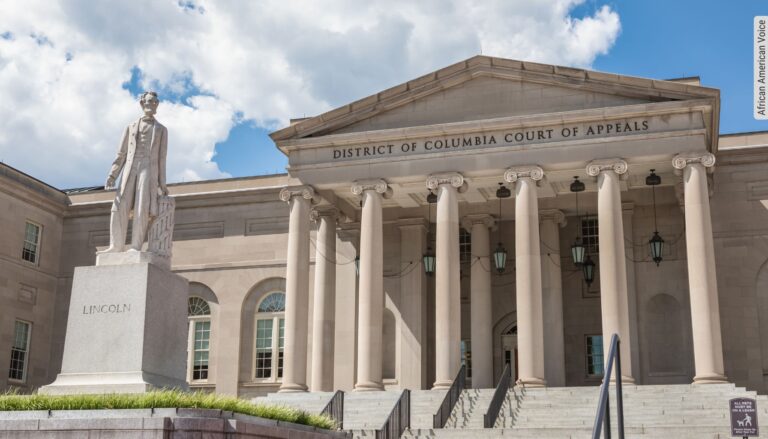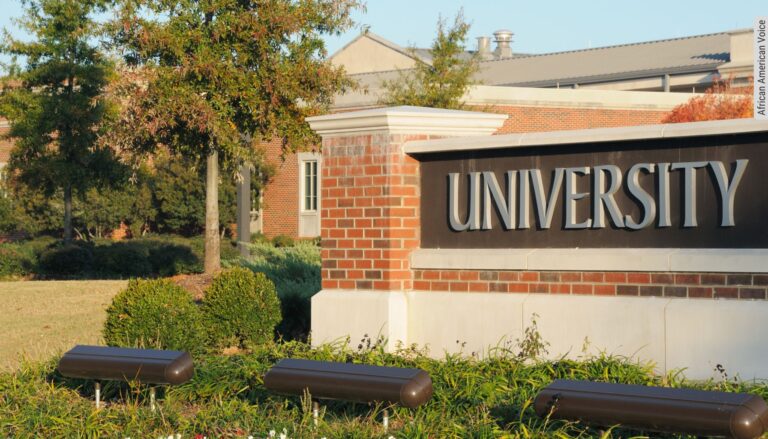
by Jada Ingleton
As Black America grapples with continuous attacks against African American history and inclusion, local faith leaders and activists gathered at Metropolitan AME Church in Northwest D.C. on President’s Day under one common notion: it’s time for organized action, and the Black church is ready to lead the charge.
The Rt. Rev. Reginald T. Jackson enlisted the help of trusted adviser Dr. Barbara Williams-Skinner, civil rights lawyer Sherrilyn Ifill, and the Rev. Dr. William Lamar, pastor of Metropolitan AME Church, to host a press conference for community members and media, driving the beginnings of a pivotal social justice movement with faith-based institutions at the forefront.
“The Black church has got to, once again, become the leader of our people,” Jackson told the crowd on Feb. 17. “We’re fighting against spiritual wickedness in high places. We have to do more than talk…From this press conference, we intend to act.”
With a packed house and impassioned congregation, faith-based speakers stood at the pulpit Monday guided in a mission to affect change amid a spiraling Trump administration. In his first month back in office — and even on his first day — President Donald Trump has signed executive orders working to erase Black history; revert constitutional rights; and eliminate diversity, equity and inclusion (DEI).
“We’re here today because what we’re seeing for 30 days is a foretaste of four years,” Skinner said. “This is already telling us that if we don’t stop it at 30 days, we won’t have a country. We won’t have a democracy.”
The historic Metropolitan A.M.E Church has been at the forefront of challenging racism. After a Black Lives Matter banner was stolen and burned during a pro-Trump rally in 2020, Enrique Tarrio, leader of the extremist group Proud Boys, was arrested for the theft and vandalism, and the church, in turn, filed a lawsuit against the organization. Earlier this month, a judge ruled in favor of Metropolitan A.M.E., granting the church the trademark rights to the Proud Boys name.
Continuing the church’s historic role as an impetus for civic reform, faith leaders took to Metropolitan to offer passionate pleas for justice, culminating in a three-point plan of action for Black churches and allies beginning March 5. The mission highlights corporate boycotts, judicial push back, and strengthening the values of Black institutions.
“This nation has never done anything right because it was right….We organize. We free ourselves,” Lamar said. “We gathered here today because, before the body can be free, the mind must be.”
Taking a Stand Against Corporate America
In alliance with Ash Wednesday and the Lenten season (the 40 days and nights leading to Easter), Jackson announced Black churches in the District will commence a 40-day boycott starting March 5 against Target, as one of several companies that have abandoned DEI initiatives.
“If our diversity is not good, our money is not good,” said the bishop. “If corporate America can’t stand with us, we’re not going to stand with corporate America.”
While the boycott will kickstart in the D.C. area, a collaboration of local Black interfaith leaders has agreed to draft a document to encourage participation from churches nationwide, with potential to extend the boycott, as well as incorporate other DEI-turned corporations.
“I really hope that as we go forward…not only Blacks, but all those who are supportive of justice, will also join us in this effort to seek to redeem all that’s going on,” Jackson said. “‘I want you to do what’s right.’ That’s what we have to be able to say to corporate America.”
Ifill pointed out that the boycott offers a critical opportunity to reinvest directly in Black-owned businesses, and encouraged attendees to shop online to avoid faulting the Black brands who market through Target and other storefronts.
Similarly, Skinner touted the growth of Black entrepreneurship and the benefits of leveraging “our money.” The faith leader reminded the congregation that the historic cycle of overcoming oppression often means constant battles between advancement and subjection. But, she noted, the important aspect is maintaining courage and faith.
“The only question we should be asking ourselves right now [is], ‘What’s our resistance?’” Skinner said. “We have everything we need to fight. We don’t need to do anything, but get enough backbone to believe that if God is with us, who can be against us.”
Challenging the Constitution to Strengthen Institutions
For Ifill, some of the most important weapons in Black America’s toolage is knowledge, consistency and being an active voice for the community.
In addition to breaking down the intersections of checks and balances, Ifill, former president and director-counsel of the NAACP Legal Defense Fund, took the time to discuss what she calls “the other constitutional crisis.”
She provided an oral history of the nation’s determination to undermine the 14th amendment, which flaunts equal protection and birthright citizenship, among other freedoms that the new presidential regime has worked to diminish through executive orders.
Ifill pushed listeners to recognize the strength of having a “loud voice” in times of turmoil. She said it’s especially important to speak out against false narratives about faith and bigoted efforts to eliminate equity for Black Americans, whose ancestry paved the way for the freedoms originally outlined about 150 years ago.
“I want us to understand that we are constitution makers, that we shape the Constitution,” Ifill said. “We’re not just out there hollering and protesting–we are making this country live up to the words in the document.”
Bishop Jackson said if Congress and the executive branch can’t be trusted, it’s time to apply pressure on the judicial front.
“I want to call on us, the Black church, to become plaintiffs. We’ve got to get into courtrooms and represent our people, the ones who are hurting and suffering by these actions, [who] sit in our congregations and live in our communities,” he pleaded. “We’ve got to put our judicial system to the test.”
Further, Ifill noted the historic context of strengthening Black institutions amid periods of unrest. Since she studied the time period of the Nadir — what many consider the lowest point for Black people post-slavery (1890 to roughly 1930s) — the law professor touted several accomplishments that thrived in the thick of racial injustice. To name a few: the establishment of the NAACP (1909), the first Black labor union (The Brotherhood of Sleeping Car Porters) in 1925, and multiple Black Greek Letter Organizations that currently comprise the Divine Nine.
In encouragement of rebuilding institutions, Lamar told The Informer it’s about more than looking to the past, but also uplifting the leaders of tomorrow.
“We cannot lose the brilliance of young people, because we are still wed to white evangelical theology, which would judge before we pull people together,” he explained. “I really think that if we were truly hospitable, and if young people were able to come in and not just be seen but heard, then we could really develop something.”
As Black churches around the city prepare to spread the news of the 40-day boycott, the collaboration of social justice and faith-based institutions is steadfast to champion the future of democracy. However beyond the church, activists emphasize that the fight is in the hands of the Black community.
“I don’t know how we want to come out of this, because we’re in a global phenomenon. We always find a way, but we have to be actively looking,” Ifill said. “We have to use our voice, we have to use our feet, we have to use our mind, we have to use our compassion. We have to strengthen our institutions and plant something for our children and their children to harvest.”
Source: Published without changes from Washington Informer Newspaper








